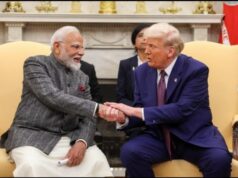Egypt’s Intelligence Chief Discusses Wagner’s Presence In Sudan
Egypt’s intelligence chief Abbas Kamel was believed to have held discussions with General Abdel Fattah al-Burhan earlier last January on ways to end the activities of the Russian Wagner group in Sudan. On January 2, the Egyptian envoy met with the head of the military-led Sovereign Council to discuss the political process in Sudan. Sources close to the meeting at the time told the Sudan Tribune that the meeting also discussed the situation in the Central African Republic (CAR) without providing further details. Speaking about the US’s moves to curb Wagner’s activities in Sudan and Libya, Kamel convoyed Washington’s concerns in his meeting with al-Burhan about the Russian presence in his country. The discussions followed a report released on January 26, where Africa Intelligence underscored the close cooperation between the Sudanese paramilitary group Rapid Support Forces (RSF) and Wagner saying that 500 of its members are deployed in the neighbouring country to support Wagner and the CAR forces in their fight against the rebels.
Source: Sudan Tribune
South Africa Considers Taking Action Against Polish Embassy
The South African government is looking at possible action it could take against the Polish embassy after a charter flight ferrying President Cyril Ramaphosa’s protection unit was grounded at Warsaw Chopin Airport. Last week, Poland blocked the South African delegation accompanying Ramaphosa to Ukraine and Russia on an African peacekeeping mission from getting off their plane for hours, citing undeclared dangerous goods on board. Journalists travelling with Ramaphosa’s protection unit were also stuck at Warsaw’s airport. In videos released by the reporters on social media, Ramaphosa’s head of security, Major General Wally Rhoode suggested the Polish move was driven by racism and sabotage. In a statement, the Polish foreign affairs ministry said dangerous goods were on board the plane without the necessary permission to bring them in. It said there were also people on board the aircraft whose presence the Polish government had not been notified about beforehand.
Source: Mail & Guardian
India Out of Nigeria’s Top-Five Trading Partners
Reports from the National Bureau of Statistics indicate that trade between Nigeria and India has dropped, with the country no longer visible on the top five trading partners of the country. Daily Trust reports that India, which has been one of Nigeria’s trading partners in recent times, occupied the number one position of Nigeria’s top export destination for a long time. Figures from the NBS show that trade with the country has taken a downward trend since the third quarter of 2022 with the country dropping to second and third in Q3 and Q4 of 2023. With crude oil making a large chunk of Nigeria’s exportation, India has been one of the major importers of the commodity but the country has turned to Russia to import the commodity which it sells at a cheaper rate due to the sanctions imposed on it by G-7 countries led by the United States.
Source: All Africa
EAC Boosts Plan To Ditch Dollar For Intra-Regional Trade
The East African Community (EAC) has stepped up the push for member states to adopt local currencies in trading with one another, instead of the bullish US dollar that is hurting economies in the region. David Ole Sankok, a Kenyan member of the East African Legislative Assembly (Eala), has tabled a resolution recommending the EAC use local currencies to boost cross-border trade. The EAC, according to a study by the African Development Bank, is the most integrated regional economic community on the continent, which explains the fluidity of trade across the borders of the member states. Recently, Djibouti’s president William Ruto in an address to Djibouti’s parliament stated, “Why is it necessary for us to buy things from Djibouti and pay in dollars? Why? There is no reason. And we are not against the US dollar, we just want to trade much more freely. Let us pay in US dollars what we are buying from the US,” said Dr Ruto.
Source: The East African
China Restructures Debt Deal With Zambia
Zambia’s creditors, including China, have agreed to restructure the country’s $6.3bn public debt, providing financial relief to the first African nation to default following the Covid-19 pandemic, officials announced on Thursday. This decision comes after protracted negotiations over differences between China and Western creditors on Zambia’s $18.6bn external debt. Market sentiment was broadly positive to the decision. Prior to the conclusion of the debt restructuring negotiations, the local currency appreciated by just over 12% in June driven mainly driven by positive sentiment. With the announcement, market analysts are predicting an additional strengthening of the Kwacha.
Source: The Africa Report
Malians Approve New Draft Constitution With 97% Of The Vote
Malians have approved the draft of a new constitution submitted by the junta in power since 2020, with 97% of the vote, the electoral authority said in Bamako on Friday, according to provisional official results. The proposed draft constitution creates a two-chamber parliament, the National Assembly, and the Senate; until now the country has only had a National Assembly. The draft also consolidates the position of the President of Mali, a move that has drawn much political debate. The military has made the draft constitution an essential cornerstone in the rebuilding of Mali, which is facing widespread jihadism and a deep multi-faceted crisis. Critics of the new constitution however claim that it is tailor-made to keep the colonels in power beyond the presidential elections scheduled for February 2024, despite their initial commitment to hand over to civilians after the elections.
Source: Africa News




